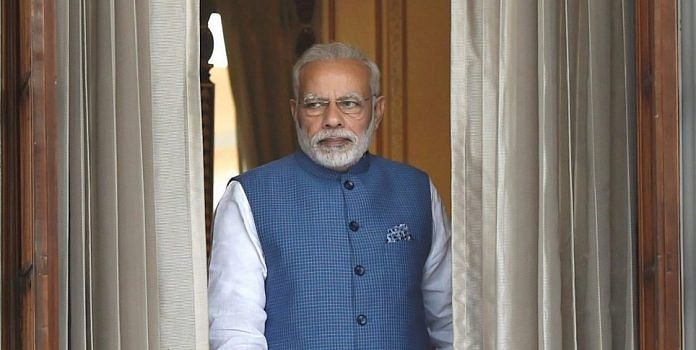Modi PMO says it doesn’t keep records of corruption complaints against ministers ‘in one place’ and collating it will divert resources disproportionately.
New Delhi: The Prime Minister’s Office (PMO) cannot divulge information about corruption complaints against ministers and action taken because the PMO doesn’t keep the records “in one place” and collating it will divert resources disproportionately.
This is the response of the PMO to an RTI application filed by ThePrint three weeks after the Central Information Commission (CIC) ordered that such information should be shared.
The CIC had directed the PMO in October to disclose complaints of corruption received against ministers and action taken on them. Chief Information Commissioner Radha Krishna Mathur’s direction came while deciding an appeal by Indian Forest Service officer Sanjiv Chaturvedi.
“After taking the needful action, the records are not kept in any single master file or collated and kept in one place. These are scattered across different sectors and units of this office,” the PMO said in its reply to ThePrint.
ThePrint filed the application on 22 October, a day after the CIC order. The PMO reply is dated 12 November.
Also read: Modi govt looks set to amend RTI Act despite opposition protests
‘Cumbersome exercise’
The Prime Minister’s Office said it receives complaints against “various Union Ministers/ high level functionaries from time to time,” including “pseudonymous and anonymous” ones.
“The complaints so received are duly examined keeping in view the veracity of the allegations/accusations and supporting documents in relation to these accusations,” the PMO said.
These complaints are “corruption-related and non-corruption-related matters”.
“The applicant has only sought details of all corruption-related complaints. To identify, examine and categorise each of these complaints as corruption-related may be a subjective as well as a cumbersome exercise,” the PMO said.
“The collation of information sought will require the undertaking of thorough search of numerous files.”
“Such an exercise will disproportionately divert the resources of the office from the normal discharge of its functions and attract the provisions of Section 7(9) of the Right to Information Act,” the PMO added.
Section 7(9) of the RTI Act says that information shall ordinarily be provided in the form in which it is sought unless it would disproportionately divert the resources of the public authority or would be detrimental to the safety or preservation of the record in question.
Former Central Information Commissioner M.M. Ansari criticised the PMO for refusing to disclose information under the RTI.
“Top echelons of the government are responsible for the prevailing corruption in the country by suppressing information,” Ansari said.
“The PMO itself seems to be responsible for encouraging such practices,” he said, citing a host of cases in which CIC’s directions were ignored by the government, including, among others, the information about bank loan defaulters.




Exactly that is taking place in PMO office to cheat Indians.
SHEKHAR JI NOW ATLEAST REALISE, STOP ADMIRING JUMLEBAJ INVISIBLY. RESPECT YOUR CONSCIOUS. THANKS.